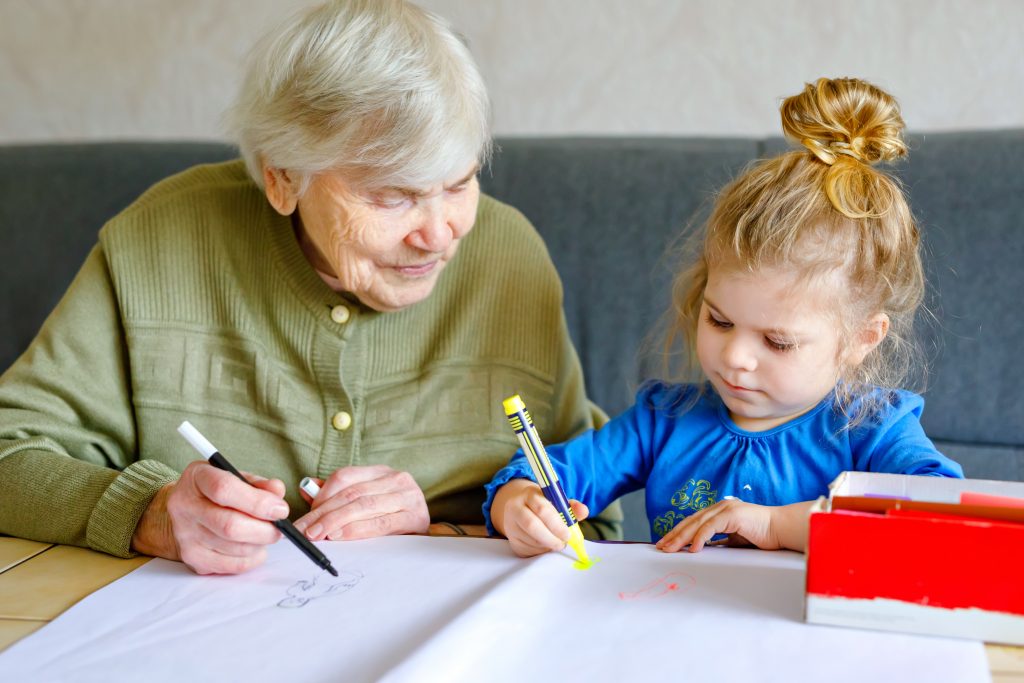Intergenerational programs benefit children and older people
By Peggy Edwards, The Council on Aging of Ottawa
First published in the Fifty-Five Plus Magazine, July/August 2023

The evidence is clear. Intergenerational connections, relationships and programs provide benefits to both the old and young. Older people participating in intergenerational programs benefit from improved quality of life, self-rated health, sense of community and self-perceptions of aging. Children involved in intergenerational programs show enhanced social and learning skills and have more positive attitudes toward themselves and older adults.
Now, we have a wonderful opportunity in Ottawa to enjoy these benefits in an exciting project designed to develop and demonstrate best practices for intergenerational programming, as a part of licensed early learning and care.
Thanks to funding from a private trust, over four years, Andrew Fleck Children’s Services is collaborating and learning with the Council on Aging of Ottawa, Families Canada and others about best practices in intergenerational programming. Neeka Barnes, Special Projects Director at Andrew Fleck Children’s Services says,
Our focus is on providing quality intergenerational programming that recognizes the rights and dignity of children and senior participants, and share our lessons learned broadly.
The project is taking place in three unique settings:
- Mooney’s Bay Intergenerational Early Learning Centre, community-based in Riverside Park
- Capital Child Care Centre, neighborhood-based in collaboration with Trinity Anglican Church
- Perley Health, co-located as part of a senior’s village, including long-term care (coming soon).
The first two sites are up and running. Currently, participating older adults–called grandfriends–mostly come from the local neighbourhood. Residents in nearby St. Patrick’s Home of Ottawa also participate in the Mooney’s Bay program.
“For our third demonstration site, we are very keen to co-locate licensed early learning and child care on the beautiful Perley Health campus,” says Neeka. In the meantime, listen carefully and you can hear the happy sounds of children, their parents and grandfriends interacting at the Perley during a weekly EarlyON playgroup that is currently offered.
The Council on Aging of Ottawa is involved in recruitment, and education and training of Andrew Fleck staff and early learning community about older people and the aging process. Molly Jones, the COA staff person working on the project works closely with Jose Fernandez, her counterpart at Andrew Fleck, to ensure the creation of an age-friendly environment that is welcoming and safe for all ages. Molly says,
Our role is to support the older adult volunteers and educate people about ageism and how older people may have different needs in terms of issues such as accessibility, the pace of moving around and hearing ability. At the same time, we happily reinforce the amazing talents and experience that older people bring to intergenerational programming.
Jose tells an enlightening story about the day one of the grandfriends attended using a walker.
The children were curious and wanted to try using the walker. It led to a good conversation with the grandfriend about walking at different stages of life. This is a natural way for children to learn how people are different and to accept without judgement that kids who are learning to walk, older people and people with disabilities may need help from others or an assistive device such as a walker.
What does intergenerational programming look like?
Neeka says,
The main goal of the program is to build meaningful relationships between the young and the old. It is key that the relationships are organic in nature and supported by the educators. Together, children and older adults decide on how they wish to spend their time.
Some grandfriends will be directly involved with the children while others will support the staff, educators, cook or office manager. Some children will snuggle with a grandfriend to read a story, while others will greet the regular visitor by name and perhaps show them a picture they’ve made. Grandfriends can share their interests, knowledge, skills, and experiences in a variety of areas including visual arts and crafts, cooking/baking, carpentry/practicing with tools, storytelling, reading, music, outdoor activities, computers, dramatic play, and much more.
One grandfriend is passing on her extensive knowledge and experience in gardening, transforming the back of the play yard to include opportunities for gardening and teaching the children with hands-on experiences—planting and nourishing seeds, vegetables, and flowers.
Want to get involved in the Andrew Fleck Intergenerational Program?
It is easy to become a grandfriend.
- Fill in and submit the form or call 613-736-5355.
- A staff member from Andrew Fleck (AF) will contact you to set up a tour and visit when you will have an opportunity to interact with the children and staff.
- If you want to participate on an ongoing basis, staff at AF will help you do the required paperwork including a Vulnerable Sector Background Check and provide an onboarding session that gives you the information you need about how the centre works and what your role will be. Grandfriends are never put in a position of having full responsibility for a child at any time, nor asked to do care activities such as changing a diaper. These are staff responsibilities.
- You decide when you want to go and the kinds of activities you would like to participate in. Then, the fun and sharing begins.
Further Information and Contacts
Andrew Fleck Children’s Services: Intergenerational Programming
Jose Fernandez, Andrew Fleck Children’s Services: jfernandez@afchildrensservices.ca
Molly Jones, The Council on Aging of Ottawa: m.jones@coaottawa.ca





